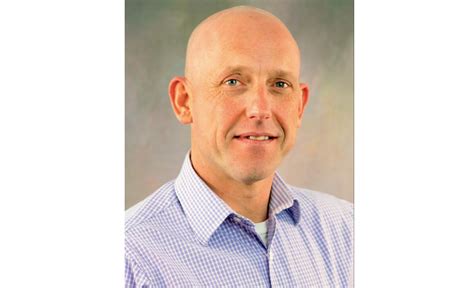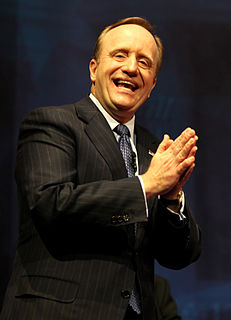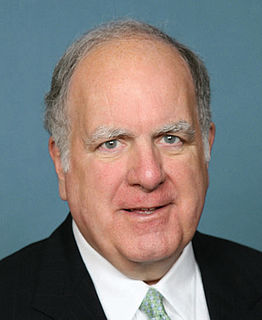A Quote by Will Durst
Budget cuts if you're not rich, tax cuts if you are. Less money for those who don't have any and more to those who do. That's how President Fredo says we're going to get out of the giant deficit hole he's dug. You can't put it any more simply. Rich people richer. Poor people poorer.
Related Quotes
His presidency ended more than a decade ago, but politicians, Democrat and Republican, still talk about Ronald Reagan. Al Gore has an ad noting that in Congress he opposed the Reagan budget cuts. He says that because Bill Bradley was one of 36 Democratic Senators who voted for the cuts. Gore doesn’t point out that Bradley also voted against the popular Reagan tax cuts and that it was the tax cuts that piled up those enormous deficits, a snowballing national debt.
When it comes to the budget, we know that we shouldn't be cutting more on core investments, like education, that are going to help us grow in the future. And we've already seen the deficit cut in half. It's going down faster than any time in the last 60 years. So why would we make more cuts in education, more cuts in basic research? Nobody thinks that's a good idea.
What the Trump tax plan is a plan to give tiny little tax cuts to most Americans, raise taxes on perhaps one in five families and shower benefits on people who earn millions of dollars a year. And this fits with a fundamental principle the Republicans have been pursuing for a long time. The rich aren't investing and creating jobs, because they don't have nearly enough money, and so we need to get them money. And the way the Republicans want to get it to them is tax cuts first, and then to take away help for children, the disabled, the elderly and the poor.
When you raise the budget, you make creative compromises. The higher the budget goes, the more cuts in your movie happen. When people talk about how movies are watered down, that's a direct reflection of money and budget. The less money you spend; the more risks you can take. That doesn't mean it will be successful, but at least you can try different stuff. The higher your budget is, the less you can do that.
We certainly could have voted on making the middle-class tax cuts and tax cuts for working families permanent had the Republicans not insisted that the only way they would support those tax breaks is if we also added $700 billion to the deficit to give tax breaks to the wealthiest 2 percent of Americans. That's what was really disturbing.
Over the past 100 years, there have been three major periods of tax-rate cuts in the U.S.: the Harding-Coolidge cuts of the mid-1920s; the Kennedy cuts of the mid-1960s; and the Reagan cuts of the early 1980s. Each of these periods of tax cuts was remarkably successful as measured by virtually any public policy metric.
The Bush Republicans' policies are, the antithesis of patriotic. And so we urge Democrats to reclaim patriotism - to call on all Americans to pull together. And, yes, to sacrifice. Rich people will have to do with fewer tax cuts. Middle class people will need to drive less and switch to more fuel efficient cars . And poor folks - especially young ones - will have to reduce out-of-wedlock pregnancies and other indicia of social pathology.
For all the gold and silver stolen and shipped to Spain did not make the Spanish people richer. It gave their kings an edge in the balance of power for a time, a chance to hire more mercenary soldiers for their wars. They ended up losing those wars anyway, and all that was left was a deadly inflation, a starving population, the rich richer, the poor poorer, and a ruined peasant class
Welfare mostly subsidizes people in poverty, helping few escape from it. In their hearts, most people who are poor would like to be rich, or at least self-sustaining, but this president never talks about how they might achieve that goal. Instead, he criticizes those who made the right choices and now enjoy the fruits of their labor. Rather than use successful people as examples for the poor to follow, the president seeks to punish the rich with higher taxes and more regulations on their businesses.
If we can’t puncture some of the mythology around austerity, politics or tax cuts or the mythology that’s been built up around the Reagan revolution, where somehow people genuinely think that he slashed government and slashed the deficit and that the recovery was because of all these massive tax cuts, as opposed to a shift in interest-rate policy - if we can’t describe that effectively, then we’re doomed to keep on making more and more mistakes.





































